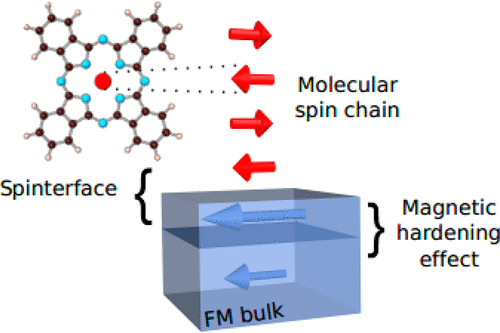当前位置:
X-MOL 学术
›
Nano Lett.
›
论文详情
Our official English website, www.x-mol.net, welcomes your
feedback! (Note: you will need to create a separate account there.)
Disentangling Magnetic Hardening and Molecular Spin Chain Contributions to Exchange Bias in Ferromagnet/Molecule Bilayers
Nano Letters ( IF 9.6 ) Pub Date : 2018-07-10 00:00:00 , DOI: 10.1021/acs.nanolett.8b00570 Samy Boukari 1 , Hashim Jabbar 1 , Filip Schleicher 1 , Manuel Gruber 1 , Garen Avedissian 1 , Jacek Arabski 1 , Victor Da Costa 1 , Guy Schmerber 1 , Prashanth Rengasamy 1 , Bertrand Vileno 2, 3 , Wolfgang Weber 1 , Martin Bowen 1 , Eric Beaurepaire 1
Nano Letters ( IF 9.6 ) Pub Date : 2018-07-10 00:00:00 , DOI: 10.1021/acs.nanolett.8b00570 Samy Boukari 1 , Hashim Jabbar 1 , Filip Schleicher 1 , Manuel Gruber 1 , Garen Avedissian 1 , Jacek Arabski 1 , Victor Da Costa 1 , Guy Schmerber 1 , Prashanth Rengasamy 1 , Bertrand Vileno 2, 3 , Wolfgang Weber 1 , Martin Bowen 1 , Eric Beaurepaire 1
Affiliation

|
We performed ferromagnetic resonance and magnetometry experiments to clarify the relationship between two reported magnetic exchange effects arising from interfacial spin-polarized charge transfer in ferromagnetic metal (FM)/molecule bilayers: the magnetic hardening effect and spinterface-stabilized molecular spin chains. To disentangle these effects, we tuned the metal phthalocyanine molecule central site’s magnetic moment to enhance or suppress the formation of spin chains in the molecular film. We find that both effects are distinct, and additive. In the process, we extend the list of FM/molecule candidate pairs that are known to generate magnetic exchange effects, experimentally confirm the predicted increase in anisotropy upon molecular adsorption, and show that spin chains within the molecular film can enhance magnetic exchange. Our results confirm, as an echo to progress regarding inorganic spintronic tunnelling, that spintronic tunnelling across structurally ordered organic barriers has been reached through previous magnetotransport experiments.
中文翻译:

解开磁性硬化和分子自旋链贡献以交换铁磁体/分子双层中的偏差。
我们进行了铁磁共振和磁力测定实验,以阐明由铁磁性金属(FM)/分子双层中的界面自旋极化电荷转移引起的两个报道的磁交换效应之间的关系:磁硬化效应和界面稳定的分子自旋链。为了消除这些影响,我们调整了金属酞菁分子中心部位的磁矩,以增强或抑制分子膜中自旋链的形成。我们发现这两种效果是截然不同的,并且是相加的。在此过程中,我们扩展了已知会产生磁交换效应的FM /分子候选对的列表,通过实验证实了分子吸附后各向异性的预计增加,并表明分子膜中的自旋链可以增强磁交换。
更新日期:2018-07-10
中文翻译:

解开磁性硬化和分子自旋链贡献以交换铁磁体/分子双层中的偏差。
我们进行了铁磁共振和磁力测定实验,以阐明由铁磁性金属(FM)/分子双层中的界面自旋极化电荷转移引起的两个报道的磁交换效应之间的关系:磁硬化效应和界面稳定的分子自旋链。为了消除这些影响,我们调整了金属酞菁分子中心部位的磁矩,以增强或抑制分子膜中自旋链的形成。我们发现这两种效果是截然不同的,并且是相加的。在此过程中,我们扩展了已知会产生磁交换效应的FM /分子候选对的列表,通过实验证实了分子吸附后各向异性的预计增加,并表明分子膜中的自旋链可以增强磁交换。











































 京公网安备 11010802027423号
京公网安备 11010802027423号